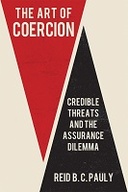Explore

The Art of Coercion presents a fresh explanation for the success—and failure—of coercive demands in international politics.
Strong states are surprisingly bad at coercion. History shows they prevail only a third of the time. Reid B. C. Pauly argues that coercion often fails because targets fear punishment even if they comply. In this ""damned if you do, damned if you don't"" scenario, targets have little reason to obey.
Pauly illustrates this logic in nuclear counterproliferation efforts with South Africa, Iraq, Libya, and Iran. He shows that coercers face an ""assurance dilemma"": When threats are more credible, assurances not to punish are less so. But without credible assurances, targets may defy threats, bracing for seemingly inevitable punishment. For coercion to work, as such, coercers must not only make targets believe that they will be punished if they do not comply, but also that they will not be if they do.
Packed with insights for any foreign policy challenge involving coercive strategies,The Art of Coercion crucially corrects assumptions that tougher threats alone achieve results.
This book is included in DOAB.
Why read this book? Have your say.
You must be logged in to comment.
Rights Information
Are you the author or publisher of this work? If so, you can claim it as yours by registering as an Unglue.it rights holder.Downloads
This work has been downloaded 10 times via unglue.it ebook links.
- 10 - pdf (CC BY-NC-ND) at OAPEN Library.
Keywords
- thema EDItEUR::J Society and Social Sciences::JP Politics and government::JPP Public administration
- thema EDItEUR::J Society and Social Sciences::JP Politics and government::JPS International relations::JPSD Diplomacy
- thema EDItEUR::J Society and Social Sciences::JW Warfare and defence
Editions

